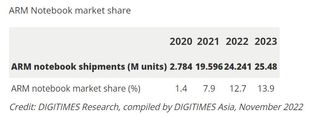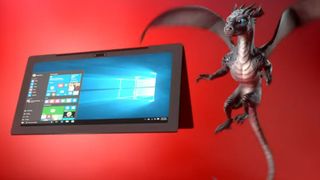Arm-Based Laptops Will Make Up 13.9% of the Market in 2023
Representing a 10-fold gain in market share since 2020

Arm processor architecture continues to make clear inroads in the laptop market, and will command 13.9% of the laptop market share in 2023, according a report by DigiTimes. This might not sound huge, but such an achievement represents an almost 10-fold improvement over 2020, when Arm-powered laptops made up just 1.4% of the market share.
The DigiTimes report also identified a second post-pandemic trend in the laptop industry, which isn't too surprising given the first — Intel is suffering from consistent erosion to its laptop market share dominance.

Things could be better for Arm-based laptops, but the entire laptop market is currently being held back by a number of macroeconomic factors: the overall IT market slump and the post-pandemic downturn in sales, as well as the strain on disposable income due to recession and inflation.
DigiTimes mentions that the laptop market has seen a 22.8% year-over-year decline in 2022, with 190 million units shipped — but expects relative stability in 2023 with shipment variation in single digit percentages. The report adds that industry consensus points to an equilibrium point of laptop shipments stabilizing at around 200 million units per year.
Apple entered the Arm-based laptop market in late 2020 with Apple Silicon-powered MacBooks, which feature a winning combo of great performance and excellent battery life. In addition to Apple's Arm-based laptops making gains, Qualcomm improved its Windows-on-Arm Snapdragon PC processors, which also gained popularity. The DigiTimes report also mentions that Arm-based Chromebooks are gaining traction — but to a lesser extent.

Meanwhile, Intel's dominant market share is looking shaky with challengers from several directions.
In addition to the advance of Arm-based processors looking to break the x86 architecture's hegemony, fellow x86 CPU designer AMD has been enjoying a new era of relative strength. AMD's new Ryzen processors seem to be particularly competitive in laptops due to their power efficiency, and AMD has released several generations of Ryzen mobile chips — building confidence in both laptop makers and consumers.
Stay on the Cutting Edge
Join the experts who read Tom's Hardware for the inside track on enthusiast PC tech news — and have for over 25 years. We'll send breaking news and in-depth reviews of CPUs, GPUs, AI, maker hardware and more straight to your inbox.
According to the DigiTimes report, Intel's laptop market share peaked in 2016 at 82.2% (in the same year, AMD had 17.8% of the market). But according to the latest figures from Q2 2022, Intel now owns just 63.5% of the market while AMD has strengthened its position with 36.4%.
That said, there probably won't be any significant churn in laptop processor market shares until 2024, when Qualcomm's Nuvia chips are expected to debut — providing yet another boost to the Arm architecture.

Mark Tyson is a Freelance News Writer at Tom's Hardware US. He enjoys covering the full breadth of PC tech; from business and semiconductor design to products approaching the edge of reason.
-
TechieTwo I have it on good authority that arm based laptops will only make up 13.8% of the market in '23. <LOL>Reply -
pug_s All the arm laptops are coming from Apple. Would like to see Microsoft have better support for ARM chips.Reply -
Kamen Rider Blade Reply
I'd rather have MS focus on improving Windows to be more stable and have less buggier patches.pug_s said:All the arm laptops are coming from Apple. Would like to see Microsoft have better support for ARM chips.
Also, less wasting time on Superficial things in Windows and more on core functionality for Power Users. -
Yes. Ms should not be worried over gui stuff. It’s good enough. They need to give us a unbloated super stable platform, but they won’tReply
I need my computer to work and what I don’t need is instability because they’ve added a bunch of graphics Crap that doesn’t add anything.
Hell most of my time is spent in a bash shell doing automated builds -
bit_user ReplyThe DigiTimes report also mentions that Arm-based Chromebooks are gaining traction — but to a lesser extent.
When I saw those stats, I figured they mustn't include Chromebooks, because I figured they'd be far higher if so. Honestly, I'm surprised by that.
there probably won't be any significant churn in laptop processor market shares until 2024, when Qualcomm's Nuvia chips are expected to debut — providing yet another boost to the Arm architecture.
Hmm... where's Mediatek? Qualcomm's 8cx Gen 3 is still based on X1/A78. We need someone to make a SoC with X3/A715.
That's one beef I have with Qualcomm. The other is that they're far too expensive. They're trying to price them like a premium product, which they're decidedly not. About the only thing they have going for them is better power-efficiency and I guess maybe built-in 5G connectivity that I don't personally even want.
Most Popular






